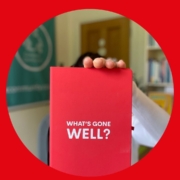Managing rumination + keeping healthy habits when you’re consumed with problems at work
This is the transcript of episode 83 of COMEBACK COACH, the podcast for people returning to work after a break.
Hello Bright Minds, I’m Jessica Chivers a coaching psychologist, the author of “Mothers Work! How to Get a Grip on Guilt and Make a Smooth Return to Work” and founder of The Talent Keeper Specialists. I’m also the developer of the Comeback Community employee experience designed to keep employees feeling confident, connected and cared for when they take any kind of extended leave from work.
This short “JUST JESSICA EPISODE” is about managing rumination, how to keep healthy habits going when you’re consumed by work and the psychology of mindful meditation. It’s inspired by a particular coaching conversation I had one Tuesday a few weeks ago. I put these episodes together myself without the lovely Chris cleaning up bumps in the sound or adding in the swanky intro and outro and I hope you get something from it. If you do, I’d love it if you shared it with someone else who you think might like it too.

What’s gone well since last time we worked together?
I start all but the first coaching session with my coachees by asking “what’s gone well since the last time we worked together?” There’s some psychology behind this question that comes from the work of social psychology Professor Barbara Fredrickson. She developed the Broaden & Build theory which says that positive emotions do much more than cause us happiness, joy, and contentment in the moments we experience them. They also broaden our behaviours (or what she calls “thought-action repertoires” which basically means the range of behaviours we can perceive and subsequently decide to take). The more positive emotions we experience, the wider the range of thought-action repertoires we have – in other words, the happier we are, the more flexible and creative we are in the way that we work.
Imagine a communications manager who’s worried about redundancy. She’s unlikely to come up with daring, innovative, award-winning comms because she’s focused on safety and survival, and not much else.
On the other hand, if we’re feeling good, our broadened behaviours help us build rich work-related knowledge, skills and abilities which Professor Fredrickson refers to as personal, physical, intellectual, social, and psychological resources. These broadened resources outlast the good feelings that initially helped generate them and they also help us cope better with difficult situations.
So by opening coaching sessions by asking “What’s gone well?” since last time I’m aiming to generate positive feelings. It’s also why we encourage coachees to reflect daily or weekly on this same question using the beautiful WGW journal we include in their Welcome Back Box that greets them when they return to work.
Coaching Charlie who was consumed by work problems
One coachee, let’s call her Charlie, answered the WGW question recently by telling me how she’d got through an uncomfortable time at work managing two people out of her team and was pleased that she’d handled it professionally and with as much care and compassion as she could. Although this was a story about what had gone well, she described how her mind had been completely consumed by the situation. This left her less able to get on with business activities in the way she normally would, distracted at home and enduring broken sleep. Our conversation happened a few days after both individuals had left the business and she was feeling enormous relief, was sleeping better and had got a shedload of work tasks ticked off in the two days since they’d gone.
In coaching time Charlie reflected that she hadn’t realised until after the team members had left just how consumed she’d been with the situation and the effect it was having on her. By consumed I mean constantly thinking about the situation, or ruminating, not working on the activities associated with managing the situation.
Here’s what else was happening to Charlie:
• Not exercising
• Drinking alcohol midweek
• Not eating breakfast or lunch
• Fuelling herself with coffee
• Being distracted and distant at home
• Falling asleep on the settee at 7pm
• Waking up in the night
• An aching, tired body
The problem was, Charlie wasn’t noticing these things. And without awareness you can’t change things. The things are a mixture of causes and symptoms (some are both) and taken together these will have put even more load on Charlie’s mind and body on top of the emotional stress of having to performance manage two team member out of the business.
I wondered whether having a ‘healthy habits’ checklist that Charlie runs through at the end of each day – irrespective of whether she feels she’s having a hard time at work – could be useful to help her in the future. My thinking is that if she gets into the habit of checking in with herself every day, she’ll spot warning signs earlier and be able to course correct.
Daily Check-In Tool
So Dear Bright Minds I put together a DAILY CHECK-IN tool and whizzed it over to Charlie for her feedback and she thought it would be helpful, so here I am sharing it with you. If what I’ve described at Charlie’s situation resonates or you’re simply curious, head to www.comebackcommunity.co.uk/dailycheckin.pdf to get a copy you can print and use.
Now let’s say a bit more about what rumination is and how to deal with it, because rumination is a problem behaviour in itself.
Before I do, if you’re listening to this before 21st May 2024 you’re in time to join our live Q&A with clinical psychologist Michaela Thomas on HOW TO LIVE WELL WITH ANXIETY AND OTHER MENTAL HEALTH ISSUES. We call these live live Q&As ‘Comeback Conversations’ because they’re informal chats with experts on topics of interest to people coming back to work from a break. They’re part of our Comeback Community employee experience programme that we deliver in some great workplaces to keep their people feeling confident, connected and cared for when they take any kind of extended leave from work. Once our clients have had first dibs we open spare spots to all absolutely free. Incidentally, you can also hear Michaela on episode 81 talking about perfectionism, ADHD and keeping resentment at bay when partners becoming parents in the context of her experience of returning to work from maternity leave firstly as a clinical psychologist in the NHS and then after her second maternity leave, working for herself.
Greg Siegle is a Professor of Psychiatry, Psychology, and Translational Sciences at University of Pittsburgh School of Medicine and he’s spent 25 years exploring rumination. That’s a lot of thinking about thinking.
Rumination
Rumination is defined in the Oxford dictionary as thinking deeply about something. I like to ruminate, may you do too. But the concept of ruminating doesn’t have particularly positive connotations – we tend to think of it as a problematic behaviour. And rumination becomes a problem when you’d like to stop thinking about something but you can’t. You might be familiar with replaying an embarrassing or hurtful conversation in your head, mentally dissecting what happened, considering what the consequences might be, why you didn’t do things differently and just going round and round in this horrible loop that takes you nowhere and leaves you feeling sh1t quite frankly and totally drained.
There’s a collection of areas of the brain that have been labelled the Default Mode Network which neuroscientists have found are active when we’re awake but not directing our attention to anything in particular. For example when we’re sitting on a train gazing out of the window day-dreaming. The flipside is when we’re concentrating on something specific such as giving someone directions or explaining to a colleague what to include in a client report, the Default Mode Network is less active.
And why do I tell you this? Well the Default Mode Network has been found to be more active in people who are prone to unhelpful rumination – and by that I mean rumination that gets in the way of daily tasks, our ability to concentrate, connect with others or to experience positive emotions. People who have a clinical diagnosis of depression are likely to have higher levels of DMN activity.
Distraction as antidote to rumination
So what’s the answer? Well according to our friend Professor Siegle from the university of Pittsburgh its DISTRACTION. Distraction is the number one way to move ourselves on from unhelpful rumination he said in the New York Times earlier this year and there’s good evidence for that. And that makes sense because when we’re actively engaged in a task that needs a lot of concentration we’ve reduced the activity of the Default Mode Network, that functional collection of areas in the brain that’s more active when we’re ruminating. Still with me? I hope so.
Right, let’s talk about meditation and how that links to all this. Meditation has been shown to reduce the activity of the Default Mode Network and to be a super helpful way to reduce rumination. Meditation exercises are essentially ways to focus very specifically on the here and now. In mindfulness meditation, we’re learning how to pay attention to the breath as it goes in and out and notice when the mind wanders. This practice of returning to the breath builds our ability to concentrate as well giving us a break from whatever has been racing around our minds. I also like using meditation mantras from the kundalini yoga tradition and I’ve included links to a couple of tracks I find myself returning to time and again.
I’ve put a link in the show notes to a very readable yet packed-with-research references link to an article about meditation and the DMN on the Mindfulness Association’s website.
As with all the episodes of COMEBACK COACH I hope you got something from what I shared today and if it’s left you with questions or wanting to make a comment please do come and talk to me. You can reach me by e-mail jc@talentkeepers.co.uk or on Instagram using the handle @comebackcommuk.
Comeback Community employee experience
COMEBACK COACH is one part of a broader package of support that we call the Comeback Community employee experience. It’s a blend of online resources, coaching, live expert Q&As, career development tools and line manager support that we deliver in organisations such as CIPD, Lily’s Kitchen, GAM Investments, Federated Hermes, FDM and more. You dear Bright Mind are the best possible person to help make the return to work experience where you work, a better one. There’s a simple, straightforward and quick way you can help us to start a conversation with your HR team. Just visit www.comebackcommunity.co.uk/introduce, fill a few boxes and leave the rest to us.
Until next time,
Stay Bright.


